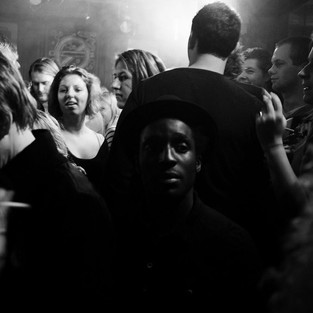?UESTIONS: Johny Pitts
- cultureisfree

- Jun 4, 2020
- 3 min read
Updated: Jun 17, 2022
Writer, photographer and broadcast journalist, Johny Pitts has won various awards for his passion exploring African-European identity. Curator of Afropean, the online journal provides an alternative look at Europe, highlighting the journey and culture of Europeans of African descent.
Johny's book Afropean: Notes from Black Europe has won the 2020 Jhalak Prize for Book of the Year by a Writer of Colour.

What is the concept of Afropean?
I encountered the word, initially, in 90s fashion and music, and found the way the soundscapes, aesthetics and stories played with the blur of two cultures very attractive. A new liminal world began to emerge that felt whole and unhyphenated, but didn't deny being plural.
I used the word as a portal, but the real world I entered wasn't as glamorous (re; oblivious!) as the world of entertainment, so eventually my reading of Afropean became less concerned with how things looked and more with how things were; a more down to earth idea that retained some of its translocal multicultural flavour but refused to turn a blind eye to less 'successful' manifestations of the notion of what it means to be Black and European.

Have your experiences from travelling had an impact of how you define culture?
Absolutely. The Liverpudlian sculptor Arthur Dooley once said 'there's no one so easy to rob of their culture than those who don't know that they've got one'.
My Dad was African American, and had a culture he could anchor himself to. Growing up in the multicultural melange of a working class area in a European City, I felt I had no real culture to call my own. That goes back to my original point about the importance of extending 'Afropean' beyond music and fashion; this notion of 'high culture' necessarily excludes what it doesn't deem en vogue.
The Afropean world I experience on my travels showed me that, in the words of Raymond Williams; 'culture is ordinary'. That is; it is everywhere, from the Surinamese market on the outskirts of Amsterdam, to the barbershops in the Congolese quarter of Brussels, and the 'burakas' on the edges of Lisbon. This notion of black, working class culture was and is very empowering to me.
As photographer, what is it you look to capture?
I play with reflections, smudges and blurs a lot. Because of this, after looking at my images the writer Jackie Kay once asked if I was inspired by W.E.B Dubois's notion of 'double consciousness'. The truth, I had to admit to her, was; 'not consciously!' But while I don't walk around with the lofty ideas of Dubious at the forefront of my mind when I'm taking snapshots, I do think the experience of having a sort of 'twoness' about me comes out in the things I am naturally drawn to, and certainly when I edit the images after.
My pictures are usually of a liminal world; shots through metro train windows, faces moving in a crowd, pensive moments, commutes. I also - and this is especially true when I photograph black people - look for banality. I don't look for things the white gaze usually demands from black subjects; dancing, coolness, carnivals, ghetto stares or sexy gestures. I want an everydayness.
When people get angered by the fact that I don't (can't) always ask to take someone's photo before taking it, I always reply; I'm not interested in posturing, I'm interested in posterity. The everyday normality of the black experience is crucial for our future generations to see.

All images courtesy of Johny Pitts
What impact would you like to make on the world?
I think of something Andre Gide once wrote; 'The sole art that suits me is that which, rising from unrest, tends toward serenity'. I don't deny that violence - intellectual or physical - is sometimes necessary to achieve the goals of an oppressed people, but that isn't in my nature. Some people think my book Afropean is depressing or uncharitable (especially in regard to Europe), but honestly it was a work of love, hope and compassion. An attempt to bring people together and share some non-judgemental truths. To shine a light on and embrace our shared, imperfect humanity.
Website: https://www.johnypitts.com/















Comments